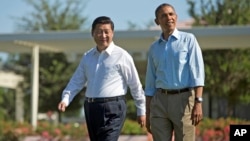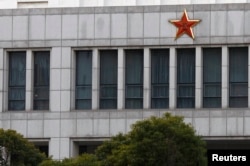The Obama administration reportedly is backing away from earlier plans to impose economic sanctions against China for the cyber-theft of sensitive data from U.S. government and corporate computers.
The shift comes following meetings last weekend between senior U.S. and Chinese officials to address what U.S. officials have said is a pattern of hack attacks coming from China that target valuable intellectual property secrets and sensitive personal information.
As first reported late last month by The Washington Post, the sanctions would have targeted Chinese individuals and corporations that allegedly have profited from the cyber-theft of data, and threatened to cast a shadow over meetings between President Barack Obama and Chinese President Xi Jinping in Washington next week.
But now the Reuters news service, citing a U.S. official who asked to remain anonymous, reports the White House will not announce any sanctions against China before Xi’s visit, and possibly not even after.
Sanctions threatened
White House spokesman Josh Earnest, at a press briefing Tuesday, would neither confirm nor deny that the U.S. would hold off imposing sanctions before or during Xi’s visit. But he did say that sanctions remain a possibility in the future.
“I think what we know about the tool of economic sanctions is that it can serve as a pretty effective deterrent, even if it hasn’t already been implemented,” said Earnest. “Merely having this response tool in our arsenal can advance the interests of the United States.”
If imposed, these economic sanctions would have represented the first time the U.S. targeted the financial interests of foreign individuals or governments solely for actions in the cyber-sphere.
Some industry analysts had reacted coolly to the prospect of sanctions out of concerns that they could spark a backlash by Beijing.
Kevin Newmeyer, a fellow at the National Cybersecurity Institute at Excelsior College, said floating the possibility of sanctions in the press may have been a tactic by U.S. officials to exert pressure on China to address the hacking attacks.
“Diplomacy is all about signals and how those signals are received, perceived, and responded to. This was another step,” Newmeyer told VOA.
Xi's meetings
Sanctions can take other forms than economic punishments, according to Newmeyer. For example, the U.S. Justice Department in 2014 indicted five members of the Chinese military for the cyber-theft of intellectual property and data from a variety of U.S.-based corporations such as Westinghouse and U.S. Steel. That, he said, also was a form of sanction.
“There was no real belief that the U.S. was going to bring these people before a court in the U.S., it was all a means of signaling intent,” he said.
The most recent rumors of sanctions, he said, may have been much the same.
“We put out the rumors that we’re going to put in these sanctions, and we see how the other side reacts,” said Newmeyer. “Obviously there was a reaction that at this point is favorable in terms of the U.S.”
Obama will meet Xi on September 25. Prior to that meeting, Xi has scheduled a meeting with the leadership of several tech companies including Facebook, Twitter and Uber.






